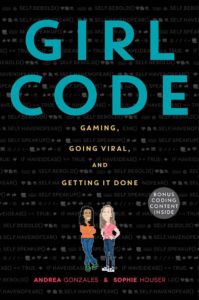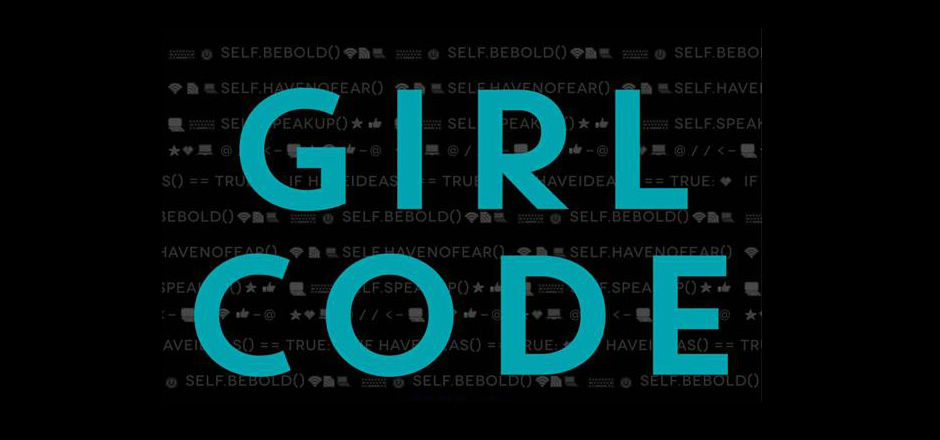It’s no surprise that there exists a huge discrepancy between the number of men and the number of women in STEM careers – we all seem to be in agreement there. It’s not so simple, however, to understand why this difference exists.
 Andrea “Andy” Gonzales and Sophie Houser try to tackle this question in their 2017 book Girl Code: Gaming, Going Viral, and Getting It Done. The book, narrated by both authors, retells the story of their experiences at Girls Who Code, a coding camp aimed at encouraging young girls to develop and maintain an interest in technology. Through the Girls Who Code summer program, the two women developed a video game, Tampon Run, and the book details both the game’s creation and the drastic changes made to Andy and Sophie’s lives after the game went viral.
Andrea “Andy” Gonzales and Sophie Houser try to tackle this question in their 2017 book Girl Code: Gaming, Going Viral, and Getting It Done. The book, narrated by both authors, retells the story of their experiences at Girls Who Code, a coding camp aimed at encouraging young girls to develop and maintain an interest in technology. Through the Girls Who Code summer program, the two women developed a video game, Tampon Run, and the book details both the game’s creation and the drastic changes made to Andy and Sophie’s lives after the game went viral.
And while it’s no doubt a book about working hard and the power of perseverance, it’s also quite clear that Andy and Sophie had a larger purpose in mind while writing their story. More than anything, this is a story about girl power, about feminism, and about the insecurities that Andy and Sophie had – themes that resonate with women everywhere.
The two women first had the idea to develop a game about the menstrual taboo when they were instructed to create a final project for their program at Girls Who Code. At first, the idea that Tampon Run would be seen as too controversial or too inappropriate to discuss was a problem they especially struggled with. Both women discussed their feelings of incompetence and fear of speaking up – especially about feminist topics. It’s the fear women have about making their voices heard and letting people know that our issues exist.
[blocktext align=”left”]It’s the fear women have about making their voices heard and letting people know that our issues exist.[/blocktext]For Andy, many of her worries regarding Tampon Run stemmed from her upbringing. She described her parents as being quite traditional when it came to gender roles, and they never discussed menstruation in their household. However, after presenting her video game to her parents at the Girls Who Code graduation ceremony, she discovered how proud her parents actually were of the game and the idea behind it.
On the other hand, Sophie’s issues with self-confidence and anxiety with public speaking oftentimes prevented her from feeling like she was able to voice her opinions. She discussed how she was too nervous to raise her hand to answer questions in school, and had a constant fear of saying something stupid in conversation. She drowned herself in her schoolwork, feeling like her grades were the only true mark of her worth.
For her, joining Girls Who Code was a liberating experience – at the camp, she felt comfortable participating in discussions and felt encouraged to give her opinions without feeling dumb. And even though she still had feelings of anxiety after the camp was over, she really was capable of overcoming her fear of speaking out.
While these fears didn’t ultimately hold the two women back from pursuing their goals, it does for a lot of girls. A recent study conducted by Lin Bian, Sarah-Jane Leslie, and Andrei Cimpian surveyed 96 children about the connection between brilliance and gender and revealed that girls aged five to seven were less likely to believe that women are as smart as men. When the researchers asked the kids about preferences for a game focused on intelligence compared to a game focused on hard work, the girls were less likely than the boys to favor the game about intelligence even though both genders expressed interest in the game about hard work.
The inferiority that many girls have about their intelligence may contribute to their discomfort about voicing their opinions about risky topics. Many girls, like Sophie, may feel like their ideas are stupid and, therefore, not worthy of discussion. And perhaps a similar fear and discomfort holds them back from expressing their interest in traditionally male-dominated fields, like STEM.
Girl Code tries to combat that fear. Since the book is written for younger teenage girls, Andy and Sophie’s success story of creating this game and their consequent involvement in the tech community comes as a source of encouragement and inspiration. It’s a step towards reversing or halting the damage on a girl’s confidence: telling her that her voice matters in the STEM field and that her opinions are important.
[blocktext align=”right”]The inferiority that many girls have about their intelligence may contribute to their discomfort about voicing their opinions about risky topics.[/blocktext]The way they related to their audience by talking about things like anxiety, family life, and other regular, teenage problems allowed young girls to see pursuing a STEM career in a less fearful light. If two women who struggled with the same problems can go after a STEM career – and be successful at it – why not other girls?
And, to top it all off, Andy and Sophie placed a big emphasis on their creativity and passion in coding. In all of the games they created while coding, the women talked about issues that mattered to them, that they were passionate about, and that they felt had societal importance. They showed young girls, yet again, that coding is not what they think it is – it’s more than just data and numbers and letters, but a way to express your interests.
Maybe these reasons – the apparent lack of creativity in STEM, the idea that the tech world isn’t a normalized career field for women, and the fear many women about their opinions and ideas being stupid – can explain exactly why so many women don’t pursue STEM careers.
But coding (and the rest of STEM) doesn’t have to be for men. It shouldn’t be. This is an industry crying out for passionate, creative women of all backgrounds to share their perspectives and insights on technology – Andy and Sophie’s experiences prove that.
Andy and Sophie did a great job taking the first step in normalizing STEM fields for women yet without exposure, the book won’t be able to serve the right purpose. It’s the job of educators to make books like Girl Code readily available for young girls, both in classrooms and libraries. Teachers and librarians are a great resource for introducing children to new interests, and their showing these sort of books to young girls can be highly influential.
It’s important for young girls to read real-life accounts of women just like them pursuing their passions despite their fears. It allows them to understand that they are capable and smart and worthwhile – that their ideas are neither stupid nor unimportant. Hopefully, other women in STEM jobs will continue to inspire young girls to not be afraid to voice their opinions, no matter how controversial or unorthodox, and help bring an end to the gender gap in this male-dominated field.
This review contains affiliate links. While Girls in Capes does make revenue from purchases made at affiliate links, reviews are not paid, and all reviews contain the staff writers’ honest opinions of the work.
[coffee]






